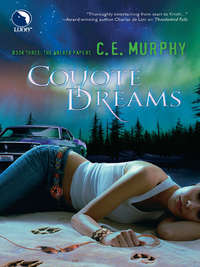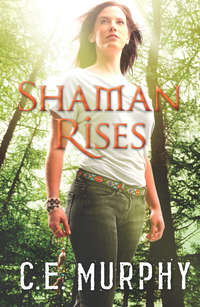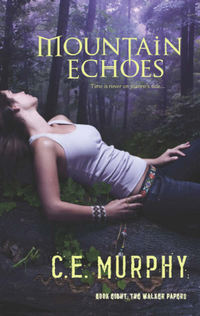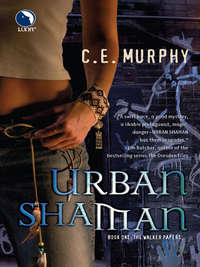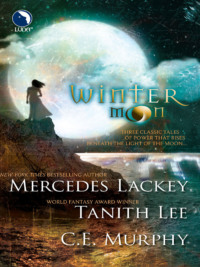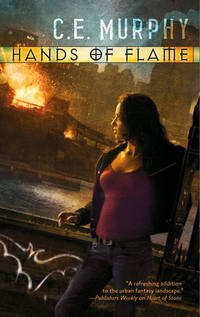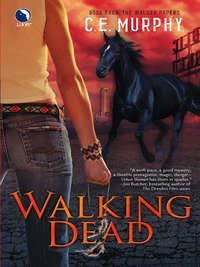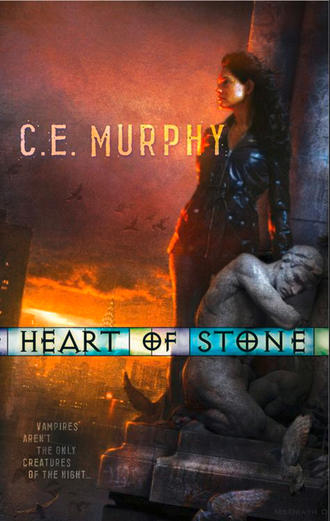
Полная версия
Heart of Stone
Ir-ra-shun-al, a corner of her brain chanted. Margrit smacked her head with the spoon. As if doing so turned up the reception, the TV in the other room suddenly got louder, a female reporter’s voice cutting through the quiet apartment: “…park improvements will have to be delayed…” The sound cut out again. Spoon in her mouth, Margrit went back to the living room and dropped into the couch, juggling ice cream and the remote to turn up the volume as she watched the pink-cheeked reporter.
“This area of the park, scheduled for renovation, is tonight the scene of a crime the likes of which has not been witnessed in over a decade,” the woman said earnestly. Locks of hair blew into her eyes and she tucked them behind an ear with a gloved hand. Margrit sat up straighter, clutching the ice-cream carton. “A young woman was brutally murdered here tonight, just beyond where I’m standing now, Jim. I have with me Nereida Holmes, who witnessed the attack.”
The reporter turned, angling her microphone under the mouth of a petite woman with large eyes and carefully arranged, flat shining curls. She wore a chocolate-brown coat, the collar lined with darker fur. In the hard white light of the TV camera, the fur looked stiff and unyielding, as if it would prick the woman’s chin.
“It looked like he hit her, no?” Nereida Holmes’s words were tinged with a faint Spanish accent. “He was crouched over her, like he was some kinda animal. Growling. There was blood on his hands. And then he saw me and ran away.”
The reporter pulled the mike back, demanded, “Can you tell us what he looked like?” and thrust it toward Nereida again.
“Um, yes, he was a white guy, maybe so tall?” She lifted a hand well above her head, some inches beyond the top of the reporter’s head, too. “He had long legs—you could see that even when he was down low. And he had light hair, real light, and good shoulders. I couldn’t see nothing else, ‘cept he was wearing a business suit, but no winter jacket.” She shook her head. “He musta been cold.”
“Anything else you can tell us?”
Nereida blanched even more. “I heard that girl screaming. It was terrible. I hope they catch that bastard.”
“Thank you, Ms. Holmes.” The reporter turned back to the camera. “Anyone wishing to report seeing a man of this description in Central Park between the hours of 10:45 and 11:15 p.m. this evening, please contact the police immediately. This is Holly Perry, reporting for Channel Three. Back to you, Jim.”
Ice cream slid off Margrit’s spoon and plopped onto her running tights, the chill immediate and sharp against her thigh. She startled, stuffing the spoon back into the carton, and reached for the remote. She turned the television off and sat, silent, staring at the blank screen.
TWO
THE BELLS OF the nearby cathedral counted out the small hours of the morning, warning of the need to retreat before sunlight found him. He watched her window from his high perch across the street, safe on an apartment building rooftop. It would be such a little thing to stand on her balcony, such an easy thing to do. To make himself just that much more a part of her life. A glance inside her world, a moment of intimacy beyond anything he’d shared in more years than he cared to recall….
Such a risk.
Logic dictated he wouldn’t be noticed, not at this hour, when so many lights were off, implying slumber behind curtained windows. It was nothing: half a block, a few floors down. He stretched and flexed as if he might make good the thought.
The danger was that, of all the windows in that row of apartments, hers was the only one with the lights still on. He shifted his weight forward, then settled back again, rumbling with indecision. Surely she slept. There’d been no movement since minutes after he’d followed her home. Surely she slept, and the amber light bathing the balcony wouldn’t reveal him to prying eyes.
Centuries of habit left him hanging back, unable to make the leap. He’d chanced it once already that evening, in speaking to her. Getting close enough to see that her curling hair was browner than he’d thought, that her petite form was even smaller than he’d expected. Close enough to see the strength in her legs and the muscle in her stomach as her shirt shifted against her skin. Soft fabric; softer-looking skin, made sallow by park lights until he couldn’t be sure of its color. He’d never seen her in daylight. He never would.
Close enough to see emotion in her dark eyes. Anger at being startled, defensiveness and caution, but not the fear he’d expected from a woman accosted, no matter how politely, in Central Park after dark. It was the lack of fear that had prompted him to follow her home.
He hadn’t done that in a long time, not in three years. He’d wondered and imagined, but never dared. She lived much closer to the park than he’d thought, west of the unfinished cathedral. He knew from signs posted on the streets that students lived there, paying prices for their postage-stamp apartments that would have bought whole townships in his youth.
There was a man in the apartment with her. His tenor voice had been by turns cajoling and concerned, while she—Margrit. Leaning back, he savored the name, baring a slow, toothy smile. “Margrit,” the man in the apartment had called her, while they’d argued over her safety and her job at something called Legal Aid.
So she was a lawyer. He had no personal experience with lawyers; he tended to think of them as white knights in pursuit of justice, though even he knew from television that the idea bordered on absurd. But still, she was a lawyer, and her name was Margrit. The information was a priceless gift, stolen from the air as their voices carried out through the glass balcony doors. It was more detail about a woman he watched than he’d learned in decades.
He curled his fingers, feeling the heavy scrape of nails against his palms, and dropped deeper into a crouch, his shoulders slumped. Consequences could not be damned. There would be no silent leap through the city night to look in Margrit’s window, not tonight and not any night henceforth.
Winter chill had little effect on his kind, but cold seemed to penetrate his bones as he accepted the truth. He drew warmth around him in a winged cloak, and put a hand down on icy cement, bracing himself on three points as he watched Margrit’s window and waited for dawn to come.
She ran across the Rockefeller Center skating rink, skidding on the ice more dramatically than she’d ever done racing the paths of Central Park. Hundreds of people surrounded her, small and dark-haired, black-eyed and smooth-skinned. None of them reached to help as she slid, but stood apart, watching her with calm wide eyes.
Heat followed her, melting the ice and turning it to water. When she lifted her gaze, the watchers wore soft fur cloaks that repelled the rising flood, while she swam against a current that came from nowhere. Nothing seemed to move them, even her stretched-out fingers pleading for help.
Hot fingers wrapped around hers, a slight man’s solid grasp. He pulled her up with surprising ease, then bowed gallantly. A white silk cravat as long as Doctor Who’s fluttered around him, catching in wind created by burgeoning heat. He whispered something indecipherable, then arched his eyebrows and nodded behind her. Margrit whipped around in a hiss of skirts, her practical running clothes replaced by a gown that she knew, instinctively, suggested a height her petite frame had never seen.
Dancers surrounded her in a ballroom filled with golden light, the small dark people at the skating rink now gliding across the floor with such grace she could only gape, admiration mixed with despair. No one could move so beautifully. Surrounded by them, she felt cloddish and slow, like a lump of earth trying to emulate a star.
Something changed. With a rustle of warning, the crowd parted to allow a tall man entrance. He wore silver, more striking than simple white, and it made him a ghost among the small dark people, eminently dangerous. His pale hair was long and loose, no longer tied back as it had been when she’d seen him in the park. A few strands fell in slashes across his cheekbones, emphasizing a brief and deadly smile.
A weapon pressed against the inside of Margrit’s wrist: a pencil. She acted without considering, leaping forward and slamming the wooden spike into the vampire’s breast.
He brought his hand up, to catch the pieces as the pencil shattered against his chest. Confusion lit colorless eyes as he lifted his gaze to Margrit’s, and she felt fury color hers.
“But it worked on Buffy!”
The last word broke, her voice cracking, and someone shook her shoulder. “Margrit. Wake up, Grit. You fell asleep on the couch. Again!” The voice was fondly impatient. “Wake up. You’re having a nightmare.”
She sat up with a gasp, then fell back on the couch, groaning. Papers crinkled under her shoulder. She put the heel of her hand to her eye, rubbing to waken herself, and swung her head to stare blearily at Cole, who crouched beside the couch.
He reached out and pulled the DVD player’s remote control device from under her hair. “You’ve got a bright red impression of this on your face,” he said. “I thought you said you were going to bed.”
“Whutimeissih?” Margrit groaned again and sat up, running her fingers over her cheek. Small indentations marred it, her jaw marked with the recognizable curve of the remote’s oversize play button. She pushed at it without focus, half expecting the TV to come on and a DVD to start running.
“It’s six-thirty.” Cole hung his arms over his knees like a gorilla. “What time did you fall asleep?”
Margrit grunted. “Two? Sunfin like that. Dyhaffa-lookso awake?” She glared at Cole.
“Yeah, I do have to look so awake.” He gave her a fond, if exasperated, smile. “I got up half an hour ago and I’ve showered. Cam’s already gone. I thought you were going to go to bed, Grit.”
“I was.” Memory cleared her mind and she scrunched her eyes shut. “I was, but I turned on the TV—” Cole growled disapprovingly and she raised her voice, ignoring him “—and the guy I told you about seeing last night probably butchered a girl in the park after I came in. I didn’t feel like sleeping after that.” She suddenly recalled her dream, remembering the pale man’s gentle movements and the strength evident in his hands. Neighbors would say he seemed like such a nice man. She shivered, bringing her attention back to Cole’s dismayed question: “Did you call Tony?”
Margrit shifted her gaze away. “No. I didn’t even think of it. It was the middle of the night.”
She could almost hear her housemate grind his teeth. “You’re on the outs again, aren’t you? It can’t be that bad. Come on, Margrit. You met a murderer and didn’t think to call your own personal homicide detective?”
She hunched her shoulders. “He’s not my own personal anything, Cole. You know how things are.”
“Call him, Grit. And promise me you’re not going into the park again after dark. Margrit, promise me.” He forced a little humor into his voice. “How’re we going to pay rent on this place if you get yourself killed? We need you.”
Margrit turned her head to the side, birdlike, to eye him. “Cam’d beat the landlord up if he threatened to throw you out. What’s the point in having a fiancée who’s a physical trainer if you can’t sic her on the bad guys?”
“She can bench-press a Mini, not defeat Chuck Norris in hand-to-hand combat,” Cole said. “So you need to not get killed, okay?”
Margrit leaned to the left, looking over Cole’s shoulder at the VCR clock. “I won’t get killed, and you’d better get going. You’re gonna be late.”
He put his palms on his thighs and levered himself up with a sigh. “Just be careful, Grit, okay?”
“I’m always careful. Go, you’re gonna be late.”
“Yeah.” Cole gave her a brief smile and left. Margrit nearly sank back down into the couch, then growled at herself and shuffled through the apartment and into the bathroom. Cole had left the medicine cabinet door open, and her reflection caught her unawares as she switched the light on.
Dark brown corkscrew curls stood out from her face, deliberate highlights of red and gold catching the light. Her hair had too much body to be ruined by a night’s sleep, but café latte skin was a mishmash of red marks from cheekbone to jaw on the right side. Margrit groaned and ran her palm over them again, serving to redden her face more without having a noticeable effect on the imprint.
“They’ll run you out on a rail, girl.” She skimmed her shirt and bra off, making a pile on the floor. Her legs had narrow lines down the sides from the seams on the running tights, and there were wrinkles on her torso from her shirt crumpling against it. Her toenails glittered gold as she climbed into the shower and stood in the water collecting in the bottom of the tub. Every three weeks she poured a bottle of clog remover down the drain, starting anew the battle against shedding hair. It was almost time to do it again.
Sunday, she promised. Sunday, she would clean the bathroom.
Twenty minutes later, wrapped in a towel and scowling at the uninspiring contents of her closet, she amended Sunday’s plans to include laundry.
“What are you doing here?”
Margrit ducked her head at the greeting, looking up again with a hint of humor dancing in her eyes. “Hi, Tony.” She’d lingered at the Homicide doorway, waiting to be noticed before entering; more than one semi-familiar face had given her a quick smile of greeting while she watched the detective who was, as Cole had surmised, her off-again lover. After weeks apart, as usual, Margrit found his warm Italian coloring and strong features surprising. Rather than making the heart grow fonder, distance made it forgetful, blurring the edges of good looks into something more white bread and bland.
Humor infused the thought. If anything, the man she’d met in the park the night before should be the white bread one, with his pale skin and paler hair, his bone structure so well shaped it might have been carved by a sculptor. Tony, by comparison, was vivacious and alive, especially now, with anger drawing his eyebrows down and bringing more color to his cheeks.
“No.” The detective got to his feet and leaned his weight on his desk, making it less a barrier and more a tool of aggravation. “You don’t get to walk in with a cheerful ‘Hi, Tony’ when you haven’t called for three weeks and I don’t even know what I’ve done wrong this time.” His hair was shorter than the last time Margrit’d seen him, clipped just the wrong length and making his ears look too big for his head. Margrit threaded through gray desks and patches of winter sunlight as he spoke. She reached him and leaned across his desk until their heads were only inches apart, answering quietly.
“You didn’t call, either, Tony. All right? Are we even?”
“No, we’re not.” His knuckles turned white from pressure before he dropped his chin to his chest and muttered, “This isn’t the place to talk about it.” A Brooklyn accent came through strong in the last words, spoken so fast Margrit leaned in another few centimeters to make sure she caught every word. “What are you doing here, Margrit?”
“Official business, actually. I wasn’t just dropping by.” Too late she realized the impact of her phrasing, but the words were spoken. He looked up, only a hint of injury visible in his brown eyes. “Tony—”
“Forget about it. What is it now, another hardened criminal to get off?”
Margrit felt her own knuckles turning white as she leaned too hard against the desk, afraid to allow herself to speak for several long seconds. “This is why it never works, Tony,” she said, all but under her breath. The argument was as old as their relationship, two people separated by the same justice system. “Can we not do this right now? It’s not going to change anything. I’m still going to go down to my job at the Legal Aid offices when we’re done talking, just like I do every day. But right now I need to talk to you.”
“You know, if you want a low-paying lawyer job, you could go work for the D.A.’s office prosecuting these bastards instead of getting them off.”
“Tony!” Margrit brought his gaze up with the sharpness of her tone, then held her breath until she trusted her voice again. “I talked with the guy you want to bring in for the Central Park murder last night.”
Personal insult and injury bled out of Tony’s face, replaced by professional interest tinged with anger and concern. “When?”
“Last night. Right before the murder. I was out running.” Margrit lifted a hand to stop the lecture before it began. “Shut up, Tony, and just let me finish, okay?” She watched him set his teeth together, holding the pose a moment before he gestured for her to take a seat. Margrit did, crossing her legs at the knee and brushing invisible lint off the slacks she’d finally selected. “The park lights bleached enough that I don’t know what color his eyes were. Light colored, blue or green, but they could’ve been yellow. Same with his hair. Pale, practically white under the lights. We talked for about thirty seconds. I can probably give a good enough description for an artist.”
Tony sighed explosively. “I’ll get one. Does Russell know you’re going to be late?” At Margrit’s nod he sighed again and picked up his phone, punching in a four-digit number and requesting a sketch artist before hanging up and turning a dark expression on Margrit again. “Why didn’t you call me last night, Grit?”
She pressed her fingertips against her eyelids, trying not to disturb the makeup she’d applied to hide signs of the nightmare she’d had. “Because I hadn’t called in three weeks,” she muttered into her palms. “Because our conversations always turn into fights. Because I didn’t know what to say. I don’t know, Tony. I didn’t know how to call.”
“Picking up the phone and dialing the number is a good start, Grit, and ‘I just met a murderer’ would have been one hell of an icebreaker. A guy’ll forgive a lot for that.”
“Especially when he’s a homicide detective.” Margrit took her hands away from her eyes, looking at the spots of soft brown eye shadow left on her fingers. “Cole’d already lectured me on running in the park, and I didn’t want more of it. I hadn’t talked to you in weeks. I didn’t know what to say. A bunch of stupid reasons. I guess it was easier to face you in sunlight.”
Tony cast a wry look at dirty, glazed windows and the thin morning light struggling through them. “In that case I’m surprised I saw you before March.”
“Tony.”
“Over lunch,” he said quietly. “Can we talk over lunch?”
Margrit lifted her eyebrows. “Are you going to be able to take lunch?”
Chagrin crossed the detective’s face and he let a shoulder rise and fall in a shrug. “I didn’t say it’d be lunch today. Look—dammit.” The last word came out softly before he stood and gestured past Margrit to a bald man approaching his desk. “Margrit Knight, this is Jason Webster, our sketch artist. You’ll be working with him on describing our suspect. Later,” he added sotto voce to Margrit. “I’ll call you later.”
She’d ducked out of the police station at ten-thirty, well before the promise of “in after lunch” she’d made her boss. Enough time to hurry home and change into workout clothes and take a daytime run in the park. It’d make everyone happy: she would get to run, and neither Cole nor Tony would have to worry.
A compulsive check of her cell phone told her Tony hadn’t called. Not that a couple hours with the sketch artist properly qualified as later, but Margrit checked a second time. As if she’d misread, she teased herself, but the mockery had more sting to it than she liked to admit to. She pushed the phone back into a zip-top pocket on her hip and lengthened her stride again, trying to capture the sense of freedom running in the park usually brought her.
It escaped her for once, her sneakers pounding out the syllables: ir-rah-shun-al. Irrational to expect him to have called already; irrational to hope it.
She went around a corner and splashed through a puddle that would be ice after dark. The whole relationship was irrational, always bordering on disaster, always coming back together. It wasn’t just the sex that kept them coming back for more, although that didn’t hurt. There was some inherent challenge they saw in one another, something unnamed that Margrit wasn’t sure she wanted to label.
What drove them apart was easier to quantify. They stood on opposite sides of a flawed legal system. It made for an endless bone of contention, but never quite enough to keep them apart for good. Some days that seemed important. Today, abruptly, it didn’t. Margrit pulled her phone out again and dialed the detective’s number.
“How about dinner tomorrow?” she asked his voice mail. “I’m sorry I haven’t called, Tony. I want to talk about it, okay?” She hung up, good humor restoring itself, as she darted around other joggers, feeling lithe and quick. Within moments, she was in a flat-out run, focusing on the horizon, nothing in the world but her harsh breathing and the ricochet of her feet against the pavement. Her blood felt hot, burning in her hands and cheeks, as tears brought on by speed blurred the corners of her vision.
Reaching the end of her route brought her to a violent stop, skidding and tripping over her own feet in the spasms of muscles pushed hard enough that they no longer knew how to do anything but continue forward. Margrit walked it off, stopping to flip her ponytail upside down and gasp for air after the numbness faded from her thighs. When she straightened it was with a clear expectation formed. Genuine surprise swept her as the blond murderer proved to be nowhere in sight.
Murderer. That wasn’t fair. He was wanted for questioning, not necessarily guilty. And he hadn’t hurt her. She was sure he wouldn’t hurt her, given a second chance.
She let out a quick blast of hot breath that steamed in the cold afternoon air. That sort of dubious logic would get her killed, if not by the blond man, then by Cole or Tony, whose concern might drive them to frustrated homicide. The sense of expectation lingered, and she frowned into winter browns and greens, searching.
New joggers, the women running in pairs or groups, made their way around people talking on their cell phones and children hauling their parents across paths. Weak light from the low sun glinted through the trees, making empty branches into shimmering sticks. An ordinary morning at the park. The dead girl hardly mattered. The blond man was nowhere to be seen.
Margrit waited, then twisted her wrist to look at her watch, shrugged, and jogged home to change clothes for work.
Something was wrong.
Sunset had come and gone, and there was no sign of his ward. His dark-haired, fearless runner. Margrit. He savored the name even as he glided from one tree to another, searching the routes she ran. She changed them regularly, a sensible self-defensive measure, but he had watched her for years. He knew the paths she preferred, the stretches of park that she defaulted to.
Did her scent linger in the air or was it his imagination? His own hope, prodding him to belief where none belonged? He had wanted to speak with her again. To hear her voice, even colored with caution. Her accusing irritation the night before had woken in him a spark of life so long dampened he was surprised to discover it still existed.
He’d hunched in the cold atop the building across the street until dawn had driven him away. Wondering, from that distance, if he might ever step past the threshold into the warmth of her life, and dismissing the possibility in the same moment.
The kitchen window had been open, wind shifting a curtain enough to allow him to see that the table in the dining room was covered with paper, used as a workspace rather than for sharing meals. Changing light flickered from the room beyond it, a television droning on. His ears had pricked, preternatural hearing picking out words even from across a street filled with city noises. He was unaccustomed to bothering with such focused listening, but last night, having learned her name, having dared as much as he already had, he’d heard stories of trouble in the park. Hardly unusual, but the man described—


